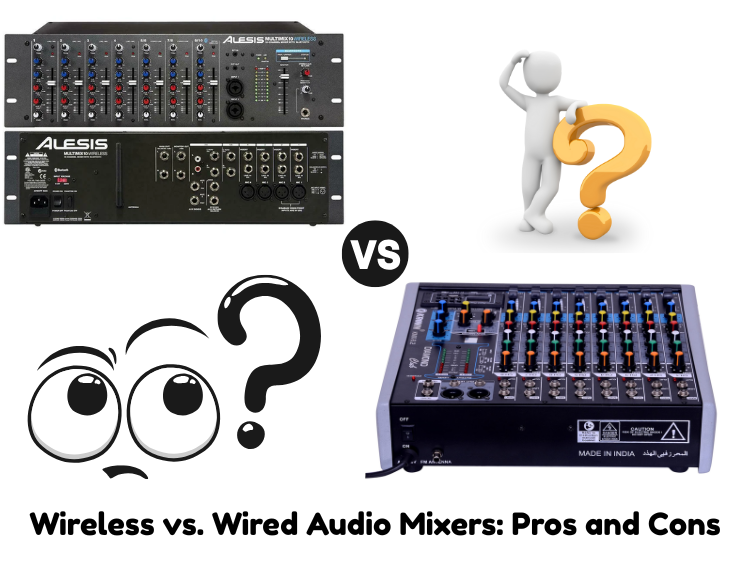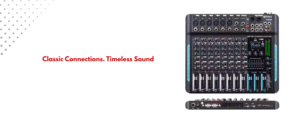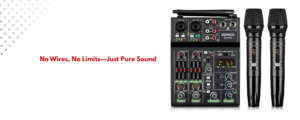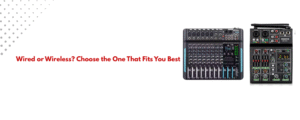When you’re making music or sound effects, it’s important to pick the right audio mixer. In this article, you’ll learn the differences between wireless and wired audio mixers—essential knowledge for recording live shows, podcasts, online content, or studio sessions. If you know what those pros and cons are, you can choose the one that works best for you and your setting.
Wired Audio Mixers: The Traditional Choice
Pros:
Signal Transmission You Can Trust
Wired mixers provide stable audio signals that don’t drop out. Wired connections stay strong as long as the wires are secure and properly connected, while wireless connections can experience interference or dropouts. If you need steady, high-quality sounds, check out top audio mixers for professional setups.
Not Too Late
Signals are sent almost instantly by wired systems. Professional audio sets need this, especially in live settings where any delay can throw off the timing of the audio and video or give actors echo effects. For seamless integration with wireless microphones, consider how to use an audio mixer with wireless microphones.
Much Better Sound Quality
Since sound isn’t reduced for wireless transfer, wired mixers usually produce better sound quality; because of this, audiophiles and pros who need the best sound choose them.
No Battery Worries
A stable AC source typically powers wired mixers, so there’s no need to monitor battery levels during critical sessions.
Cons:
Not Very Mobile
The fact that wired mixers are connected is their biggest flaw. Movement is limited by cables, which can be a problem in live settings that change quickly, especially for DJs, live acts, or mobile sound techs.
Managing the Cables
Having to deal with a lot of wires can be a nightmare—they can cause trips, be a mess, and need to be maintained or replaced all the time because they wear out.
Complexity of Setup
It usually takes longer and more work to set up and take down wired systems, which makes them less useful for quick setups or short-term gigs.
Wireless Audio Mixers: The New Rival
Pros:
Let Go and Be Flexible
Mobile apps or tablets are often used to handle wireless mixers, which let sound workers move around the venue, change levels, and fix problems while they’re on the go. In real life, this movement can make a big difference.
Less Messy Setup
Wireless setups look clean and professional because they don’t have a web of cables. This is especially helpful in small areas or places where people are sensitive to what they see, like weddings or business events.
The Key Remote
You can make changes to wireless mixers from a distance, so you can make changes in real time without being at the controls. This works great for businesses with only one person or a few employees.
Small and Easy to Carry
Many wireless mixers are smaller, lighter, and easier to carry than traditional mixing boards because they are made to be portable.
Cons:
Signal Interference is Not Good
Other devices that use the same bands as the wireless mixer can cause disturbance. These could be Wi-Fi routers, smartphones, or Bluetooth devices. This could lead to noise or hearing dropouts.
Problems with the Battery and Power
A lot of wireless mixers run on batteries and are controlled by computers or phones. If you don’t have backup systems in place, losing power during a show can be hugely bad.
Worries About Latency
Many newer wireless mixers have faster response times, but there may still be a small amount of delay that can be heard when watching music in real time.
Limitations on Connectivity
If your venue’s Wi-Fi isn’t very good or there are too many devices connected to it, it can make the player less stable. In some situations, a specialized server may be needed for the best performance.
Which One Should You Choose?
Ultimately, the choice between wireless and wired audio mixers comes down to your unique use case, budget, and personal tastes. Here’s a quick guide:
Choose Wired If You:
- Need steady, high-quality sounds with zero gaps.
- Work in a studio or fixed set-up that you can handle.
- Want to avoid problems with power or connection.
- Are taking part in live events with a lot at stake where dependability is key.
You can also learn mixing tips for live streaming to enhance sound quality.
Choose Wireless If You:
- Need to be able to move around and be flexible for recording live sound or on-site.
- Want a setup that is cleaner and smaller.
- They are used to controlling things with their phones and apps.
- Choose current options that have tech-savvy features like app connection and online mixing.
Last Thoughts
Due to progress in audio technology, both wired and wireless mixers are now good options for pros and amateurs. While wired mixers are still popular because they are reliable and produce better sound, wireless mixers are quickly becoming the standard for modern audio production because they are more portable and easier to use. The line between wired and wireless technology is becoming less clear with improvements in low-latency wireless transfer and strong app interfaces. This means that the best answer might not be to pick one over the other, but to combine them into a mixed setting that balances performance and freedom.




